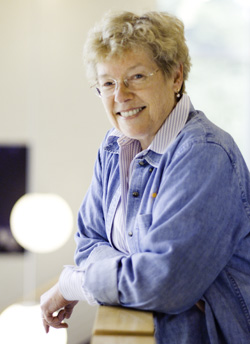The California Academy of Sciences has awarded its highest honor, the Fellows Medal, to Sandra Faber, professor emerita of astronomy and astrophysics at UC Santa Cruz. This award is given to especially prominent scientists who have made outstanding contributions to their scientific fields.
In addition, two UC Santa Cruz professors are among the 10 new fellows elected to the California Academy of Sciences in 2016. They are Karen Holl, professor of environmental studies, and Erika Zavaleta, professor of ecology and evolutionary biology.
Academy fellows are distinguished scientists who have made notable contributions to one or more of the natural sciences. They are nominated by their colleagues and appointed by the board of trustees to govern the academy. Induction of new fellows and presentation of the Fellows Medal take place at the academy's meeting on November 15. Faber, who is currently out of the country, will give an acceptance speech by pre-recorded video.
Faber is known for her pioneering research on the formation and evolution of galaxies, distant galaxy clusters, and the large-scale structure of the universe. She helped create the CANDELS project, the largest survey of the universe undertaken by the Hubble Space Telescope. This incredibly rich database provides unique material for studying every aspect of galaxy evolution, from mass assembly to star-formation. Faber's multifaceted projects—including the DEEP2 survey of 50,000 distant galaxies—often include the participation of her former students. A member of the National Academy of Sciences, American Academy of Arts and Sciences, and American Philosophical Society, Faber has received many awards and honors in recognition of her accomplishments, including the National Medal of Science. She joined the UCSC faculty in 1972.
Holl is the faculty director of the Kenneth S. Norris Center for Natural History at UC Santa Cruz. Her research focuses on understanding how local and landscape-scale processes impact ecosystem recovery from human disturbance, and how this information can help restore damaged ecosystems. She conducts research in Latin American rainforests and in chaparral, grassland, and riparian systems in California. Selected as an Aldo Leopold Leadership Fellow in 2008, Holl is a dedicated science communicator and teacher committed to lending her expertise to the next generation of scientists. She received her Ph.D. from Virginia Tech and completed a postdoctoral fellowship at Stanford University before joining the UCSC faculty in 1995.
Zavaleta is the founder and faculty leader for the Doris Duke Conservation Scholars Program at UC Santa Cruz. Her research group studies the drivers and consequences of changing biological diversity and climate, and the role of ecology in guiding effective conservation and climate change adaptation practice. Ecosystems of California (UC Press, 2016), a new comprehensive reference of California's ecological abundance coedited by Zavaleta, is nominated for a 2017 American Publishers PROSE Award. She received her undergraduate and graduate degrees at Stanford University.
The California Academy of Sciences, based in San Francisco’s Golden Gate Park, is a renowned scientific and educational institution dedicated to exploring, explaining, and sustaining life on Earth.



